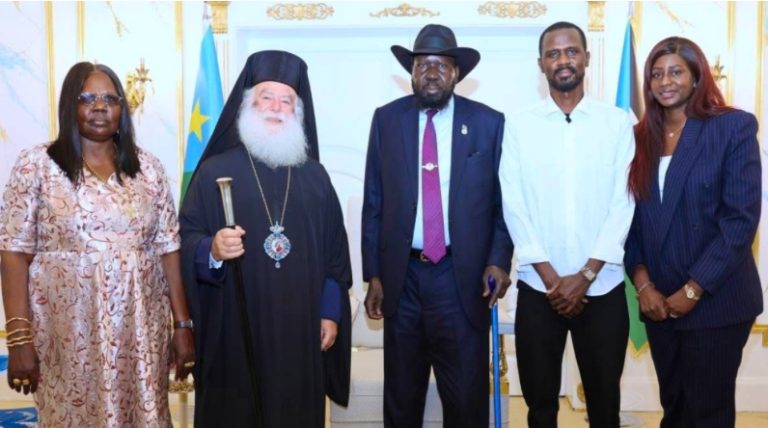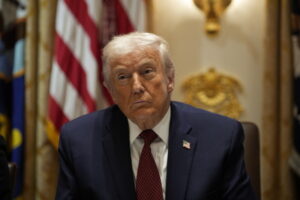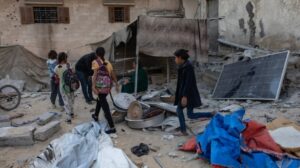In a landmark event, Patriarch Theodore II of Alexandria made his first-ever visit to South Sudan from February 21 to 24, 2025. This historic trip marked the first time a Patriarch of Alexandria has ever visited the country, and it carries significant cultural, religious, and diplomatic importance, especially in light of the ongoing challenges the country faces.

During his visit, Patriarch Theodore II met with various government officials, including South Sudan’s President, H.E. Salva Kiir Mayardit, and the country’s First Lady, Maria Yalluri Kiir Mayardit, who is of Greek descent. Their discussions highlighted the deep-rooted ties between Greece and South Sudan, as well as the strong cultural bonds shared by the Greek community living in the region. Particularly moving was the Greek First Lady’s emotional reception of the Patriarch, who is also her spiritual leader. She expressed her wish for the restoration of the Greek school in Juba, ensuring the continuation of the Greek language and cultural legacy for future generations.

Strengthening Ties and Promoting Education
One of the key issues discussed was the reopening of the Greek school in Juba. This school, a vital institution for the Greek community, had been closed for years, but the First Lady expressed her heartfelt desire for its reopening. The Patriarch, in turn, promised to work with Greece and Cyprus to help make this a reality. He emphasized the importance of preserving Greek heritage and culture in South Sudan and promised to keep the community in his prayers.
During the meeting, the First Lady shared the story of her grandfather, who came to South Sudan from Mytilene in 1931. She spoke of his early struggles and the important role the Greek community has played in the country’s development, particularly in trade.
A Historic Religious Service
On Sunday, February 23, the Patriarch led the first-ever Patriarchal Divine Liturgy in South Sudan at the Saint Panteleimon Chapel, located within Dr. Linderman’s polyclinic in Juba. It was a momentous occasion for the local Orthodox community. The Divine Liturgy was attended by Greek Orthodox refugees, priests, local officials, and members of the Greek community. During his sermon, the Patriarch praised the resilience of the Greek Orthodox people in the region, who have persevered through war, insecurity, and economic hardship.
The Patriarch also called for an urgent response to the needs of the Greek-speaking children of South Sudan, vowing to work with the relevant ministries in Greece and Cyprus to send a teacher to the region to help preserve the Greek language.
A Mission of Peace and Support
Despite the difficult conditions in South Sudan, including ongoing conflict, poverty, and hunger, the Patriarch’s visit brought a sense of hope to the country. He met with South Sudanese religious leaders and expressed his concern over the current situation. He assured them that the Orthodox Church would continue to support the country’s citizens, with plans to send an Orthodox bishop to South Sudan to help guide the local community.
The visit also underscored the church’s role in providing humanitarian support. In particular, the Patriarch promised to launch a program aimed at alleviating the suffering of South Sudanese leprosy patients, as leprosy remains one of the country’s deadliest diseases after malaria.
Addressing the Humanitarian Crisis
During his visit, the Patriarch was deeply moved by the accounts of families struggling to survive on just one meal every two days. In response, he reiterated his commitment to raise awareness within the international community about the plight of South Sudan’s citizens. He emphasized the importance of peace and stability for the country’s future.
The Role of the Greek Community
South Sudan has a significant Greek presence, especially among the Orthodox community. The Patriarch expressed his gratitude for the Greek people’s contributions, highlighting the role of Greek immigrants in the region’s trade and development. Despite the many challenges, the Greek community has remained a pillar of support, ensuring that the cultural and religious traditions of Greece continue to thrive in South Sudan.
The Patriarch’s visit also shed light on the ongoing efforts to restore the Greek Orthodox churches that were once central to the country’s religious and cultural life. Discussions were held on the reconstruction of these churches to help maintain the Orthodox Christian presence in the region.
A Call for International Support
The Patriarch’s visit to South Sudan is a call for greater international attention to the country’s humanitarian crisis. It is also a reminder of the enduring role of the Orthodox Church and the Greek community in providing support and fostering peace in troubled regions.
The hope is that this visit will inspire further cooperation between Greece, Cyprus, and South Sudan, ensuring that the cultural, educational, and humanitarian needs of the people in the region are met. As the Patriarch departs South Sudan, he leaves behind a message of hope and solidarity, promising that his prayers will continue for the peace and prosperity of the South Sudanese people.
In the face of adversity, the Greek Orthodox Church remains a beacon of faith, resilience, and support for those in need, both in Africa and beyond.
Ask me anything
Explore related questions





